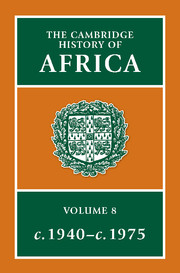Book contents
- Frontmatter
- Introduction
- 1 The Second World War: prelude to decolonisation in Africa
- 2 Decolonisation and the problems of independence
- 3 Pan-Africanism Since 1940
- 4 Social and cultural change
- 5 The economic evolution of developing Africa
- 6 Southern Africa
- 7 English-speaking West Africa
- 8 East and Central Africa
- 9 The Horn of Africa
- 10 Egypt, Libya and the Sudan
- 11 The Maghrib
- 12 French-speaking tropical Africa
- 13 Madagascar
- 14 Zaire, Rwanda and Burundi
- 15 Portuguese-speaking Africa
- Bibliographical essays
- Bibliography
- Index
- References
14 - Zaire, Rwanda and Burundi
Published online by Cambridge University Press: 28 March 2008
- Frontmatter
- Introduction
- 1 The Second World War: prelude to decolonisation in Africa
- 2 Decolonisation and the problems of independence
- 3 Pan-Africanism Since 1940
- 4 Social and cultural change
- 5 The economic evolution of developing Africa
- 6 Southern Africa
- 7 English-speaking West Africa
- 8 East and Central Africa
- 9 The Horn of Africa
- 10 Egypt, Libya and the Sudan
- 11 The Maghrib
- 12 French-speaking tropical Africa
- 13 Madagascar
- 14 Zaire, Rwanda and Burundi
- 15 Portuguese-speaking Africa
- Bibliographical essays
- Bibliography
- Index
- References
Summary
The apocalypse, an influential Belgian magistrate wrote at the end of his colonial career, was due in 2026. University graduates, mutinous soldiers, and messianic religious figures would sweep away the massive colonial edifice constructed by Belgium in Central Africa. Nationalism and Pan-Africanism were the ineluctable consequence of education and modernisation; the achievements of the colonial system, to our satirical jurist, contained ‘the germ of their own destruction’. Elements of this prophecy were to find their echo in the momentous transformations compressed into the third of a century from 1940 to 1975. A series of shock waves totally altered the political landscape: a nationalist explosion in Zaire that engulfed the prudent calendars and Eurafrican visions of the coloniser, the turbulent eddies of which finally gave way to the would-be leviathan state of Mobutu Sese Seko (Joseph-Désiré); an ethnic revolution in Rwanda, and a precarious ethnocracy in Burundi, with the liquidation of the historical monarchies in both. As the Second World War began, however, virtually no one had any premonition of the sea changes in store.
The formal structure of the colonial state was in many respects the logical prolongation of the absolutist Léopoldian state. The centralised personal control the monarch aspired to achieve had as its counterpart the pronounced concentration of powers in the metropolitan colonial organs in Brussels. Executive authority was vested in the Ministry of Colonies, whose staff – and usually minister – tended to be recruited from Catholic and conservative milieux. The royal family also maintained an active interest, political and economic, in colonial affairs.
- Type
- Chapter
- Information
- The Cambridge History of Africa , pp. 698 - 754Publisher: Cambridge University PressPrint publication year: 1984
References
- 1
- Cited by



